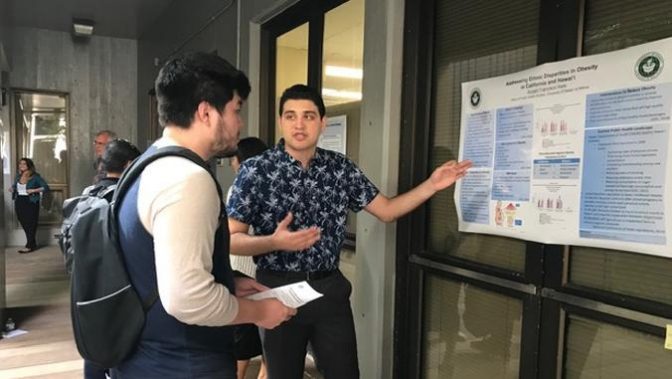By Staff Reports
(Hawaii)– After months of data collection, analysis and thinking critically about public health issues, more than 50 undergraduates in the Office of Public Health Studies at the Myron B. Thompson School of Social Work put their hard work on display at the Public Health Undergraduate Summit.
The bi-annual event drew students and faculty members from the University of Hawaiʻi at Mānoa campus, as well as alumni and public health community members, who viewed posters and exhibits at the Biomed building.
“This semester’s summit was a huge success,” said Denise Nelson-Hurwitz, assistant professor and chair of the public health undergraduate program. “These projects make a valuable contribution to the public health community and to research being conducted in Hawaiʻi.”
Projects focus on indigenous peoples
Student projects spanned all aspects of public health, and many focused on the health of Native Hawaiians and other indigenous peoples.
Leila Chang explored the relationship between globalization and changes in the diet of Samoans, while Cherry Yamane looked at ways to reduce health disparities in indigenous populations using interventions based on culture.
In one project, which dealt directly with public health at UH Mānoa, Pua Yang conducted an assessment of mosquito breeding sites on campus. She discerned that mosquito-borne infections due to the insect’s larvae, which accumulate in standing water, could be reduced by cleaning up littered coffee cups.
Prevention was a popular theme with other students as well, with projects focusing on cardiovascular disease from Kelly Knowles, breast cancer from Nathalie Lozano and diabetes from Haleigh Romero.
Some students presented their literature reviews, an early step of completing a project, and are slated to present their completed findings at the next Public Health Undergraduate Summit in May 2019. Julia Andaya shared her literature review on promoting oral health education in kids, and Charlene Mikee Nguyen is looking at early findings of promoting breastfeeding to expectant women.
Capstone projects cap off academic learning
Undergraduates nearing graduation presented their capstone projects, which are completed over three semesters. The students first familiarize themselves with a public health topic, then work to address it under the mentorship of a community-based or research faculty advisor. They finally link their field experiences and academic learning into a final paper and poster presentation.
“Student capstone projects make a difference in the way we understand the public health issues facing our communities,” said Nelson-Hurwitz. “The projects show that our students are truly well-prepared to enter the public health workforce in Hawaiʻi or go on to graduate school. It is always exciting to see where our students go next with their work.”
For the full story, see the website.

